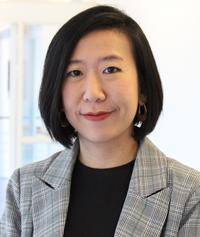Meet Apinya Nilsson
After eight years of working as an internal auditor in different countries in Asia she decided to change careers. In her Phd project she studies how multinational enterprises design and implement strategies to manage its foreign subsidiaries for long term growth. Meet Apinya Nilsson, one of the doctoral students at the Department of Business Administration.
Can you tell a little about yourself?
- My name is Apinya from Thailand. Previously, I got a master's degree in Business administration, Major finance, and accounting at Karlstad University, Sweden, in 2012. I was very impressed with the Swedish education system. Compare to the education system in my hometown, the students here were allowed to ask questions, express their ideas, and learn to think outside the box. After graduated, I worked as a Regional Internal auditor in different countries in Asia, such as Thailand, Vietnam, Malaysia, Cambodia, etc., for around eight years. Then I decided to pursue my career as a Ph.D.
What is your research about and what made you interested in that topic?
- My research is about how multinational enterprises design and implement strategies to manage its foreign subsidiaries for long term growth. I'm interested in this topic because of my working experiences. Although I only worked in the Asian market, I experienced that each country has its unique characteristics. There is no one strategy that fits all. And with the rapidly changing environment and the current situation of the COVID-19, the business enterprise needs to evolve and become more resilient to cope with these unanticipated circumstances. Therefore, I would like to extend more of my knowledge on this topic.
Why did you choose to study at the University of Gothenburg?
- First of all, because of its reputation that it is one of the best universities in Sweden. When I searched for the university to apply for a PhD, I looked at the research contributed by the university. I found out that the Department of Business Administration research has provided extensive, diverse and influential knowledge within this field, which is why I decided to apply here.
What is life like as a doctoral student?
- Overall, it is a very good and great experience so far. We get support from the university. My supervisors always give advice whenever I need. Life as a doctoral student can be tough sometimes, especially when I am new to an academic career. We sometimes feel stressed with the deadline and the quality of our work. But I think the best thing is the friends that I met here. We always support each other through good and bad times, and I think that's what makes PhD life a lot easier.
What are the advantages of being a doctoral student in Sweden?
- I think that it's great access to opportunities. We can access information and knowledge resources such as the university's library and databases, attend the seminars from both internal and external researchers, etc. We have a chance to meet, exchange ideas, and work with many knowledgeable professors, researchers, and colleagues from worldwide. A doctoral student here is also funded for the four-year programme and treated as a part of the university's staff, which I think allows better working conditions for us compared to other countries.
What do you like about Gothenburg? Favorite places?
- I think Gothenburg is a good combination of a vibrant urbanity and nature. My favourites places are the archipelago where you can visit the island, beaches and the charming small villages in summer—Liseberg where you can see beautiful lights and Christmas market in winter. And lastly, Haga where you can find lovely cafés for Fika!!
